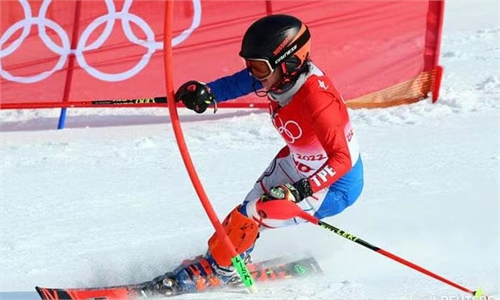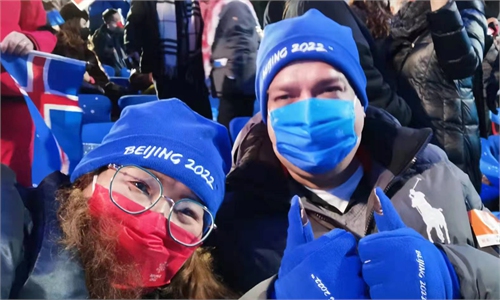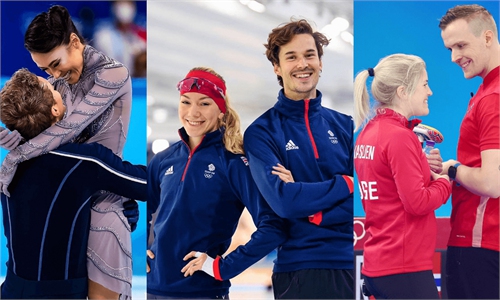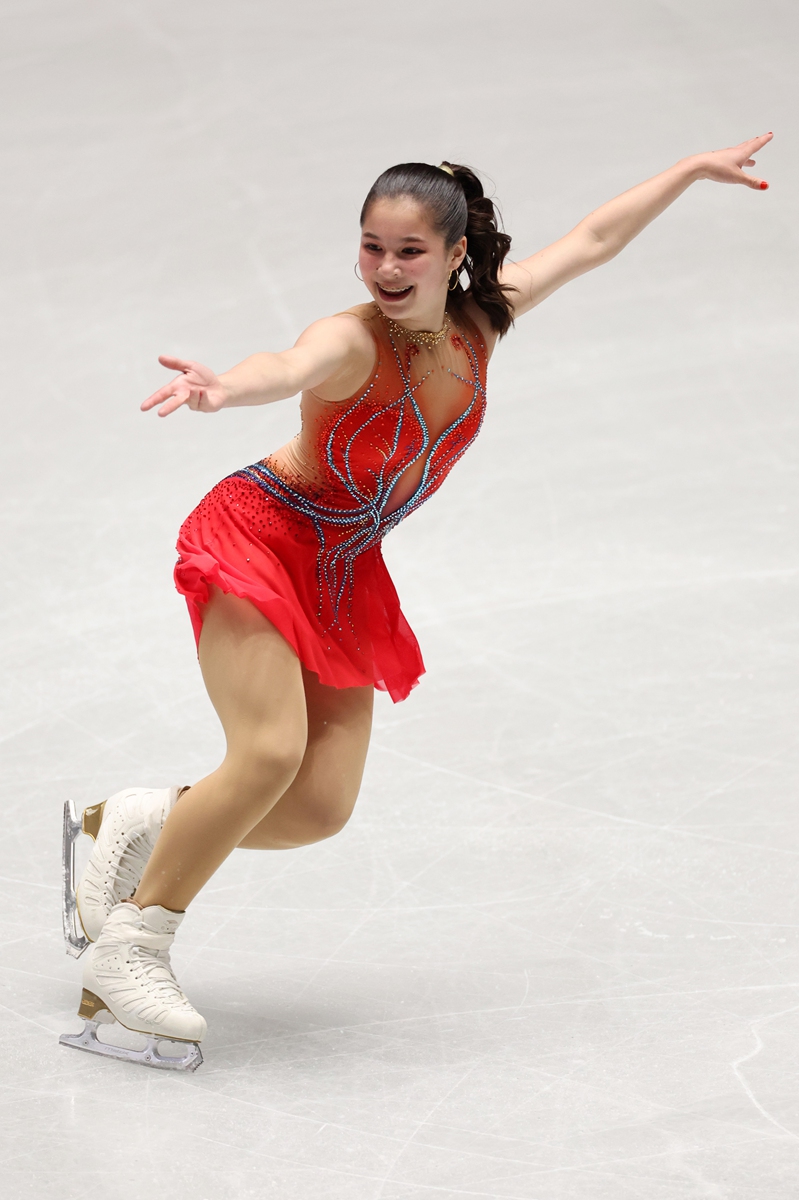
Alysa Liu of the US competes in the women's short program on November 12, 2021 in Tokyo, Japan. Photo:VCG
Foreign athletes with Chinese heritage are under the spotlight at Beijing 2022 like at no other Winter Olympics as they travel back to where their ancestors or parents used to live to compete on snow and ice.
Former US figure skater Michelle Kwan, a two-time Olympic medalist and six-time world champion, enjoyed wide support in China during her sporting career. Now her much younger successors, led by the newly crowned Olympic men's singles gold medalist Nathan Chen, are seemingly unable to match the popularity Kwan used to enjoy.
Though winning the men's singles with a near-perfect performance to a score of 218.63 for the program, which launched him to 332.60 points overall, Chen was totally overshadowed afterward by Japan's Yuzuru Hanyu who planned to land a limit-pushing quadruple Axel jump at the Olympics but ended outside the medals in fourth place.
Instead of applause, Chen received online vitriol due to his comments in October 2021 that appeared to be accusing China and a controversial piece of music he used in his free skate at the Pyeongchang Games in his Olympic debut in 2018.
The three-time world champion also points out the importance of Beijing, where his parents first met, to his family's history.
"It means the world to be able to be here. My mom grew up in Beijing... And of course, my dad spent a lot of time in Beijing as well," he told reporters.
Ironically, it seems he was not that welcome in the US either despite winning gold for Team USA. A recent New York Times article said Asians are "vividly overrepresented" in figure skating.
"Asians make up around 7 percent of the US population but have become vividly overrepresented in ice rinks and competitions at every level, from coast to coast," said the article.
Along with Chen, three other skaters with Chinese heritage were summoned to represent the US at the Beijing 2022 Olympics.
One is Vincent Zhou, who made his Olympic debut at Pyeongchang 2018 and was also in the US team who clinched a silver medal in the team skating event at Beijing 2022.
However, the figure skater had to withdraw from the men's short program at Beijing 2022 after confirming an earlier positive COVID-19 test after winning the team silver.
"While it was always my dream to medal on an Olympic stage, which I did accomplish before this happened, the overarching dream was just to skate. If I didn't love this, I wouldn't still be doing it and I know I love this. That passion goes a long way," Zhou said in an emotional video posted on his social media accounts, including China's Twitter-like Sina Weibo.
Teenage dream
US figure skater Alysa Liu is one of the youngest skaters on the ice at Beijing 2022, but the folks back home are hoping that the 16-year-old's first Olympic Games will mark the start of a bright future.
That is not something that the US women's team have had for some time. Liu's Beijing 2022 teammate Karen Chen is the first female skater from the US to appear at back-to-back Games since Sasha Cohen competed at Salt Lake City in 2002 and again Turin in 2006.
Liu was named to the US figure skating team despite having to miss the US Figure Skating Championship in January after testing positive for COVID-19.
She has a maturity beyond her years when it comes to skating, with her calm coming from a pre-skate ritual. Liu has already made history in her short career, becoming the youngest-ever winner of the US Figure Skating Championship back in 2019, aged just 13.
There will be many more congratulations if Liu can end the US wait for a women's individual medal at the Olympics.
Double-faced brothers?
The Hungarian short-track speed skating team was quite popular in China as it features two skaters with Chinese heritage: Liu Shaolin and Liu Shaoang.
Born in Budapest to a Chinese father and a Hungarian mother, they helped Hungary win Olympic gold in the men's 5,000 meters relay at Pyeongchang 2018. The duo enjoys popularity in China thanks to their fluent Chinese-speaking skills - often with a Northeast China accent. 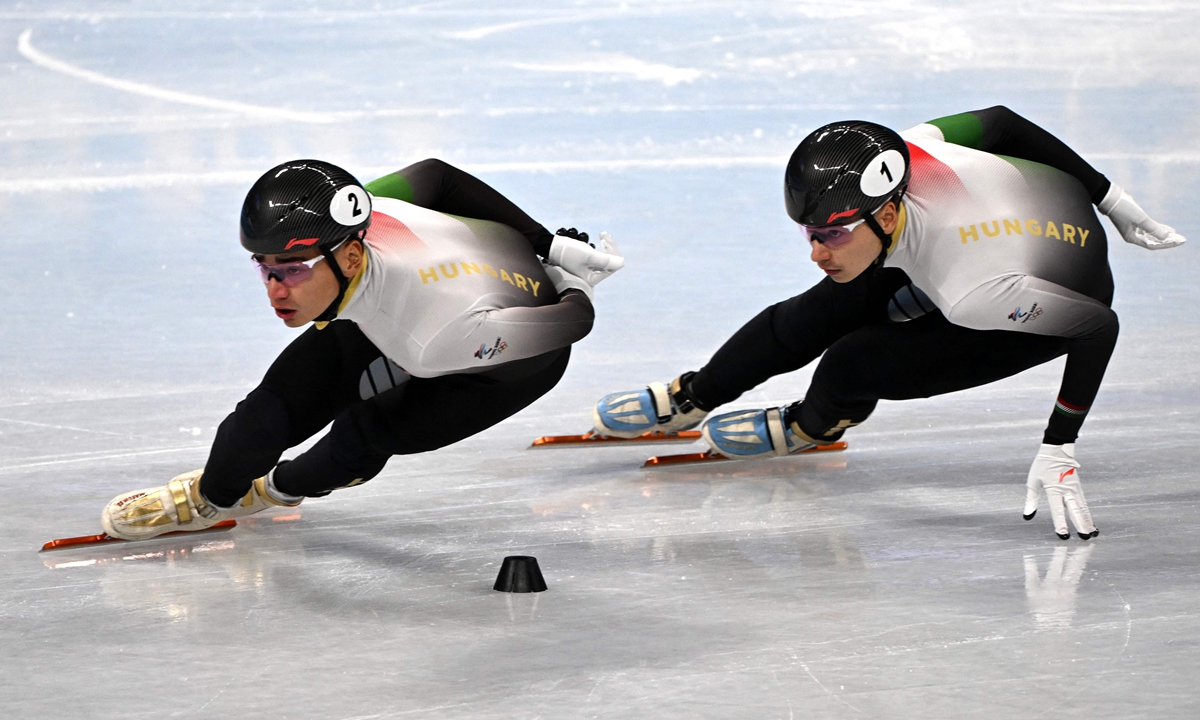
Hungary's Liu Shaolin (No.2) competes ahead of his brother Liu Shaoang in the semifinal of the men's 1,000 meters short-track speed skating event in Beijing on February 7, 2022. Photo:VCG
When the brothers were young, they were trained in Northeast China's Jilin Province for a prolonged period, a place to establish quality skating skills as well as the accent. It is also during that time the Liu brothers developed good relationships with future Chinese skaters like Wu Dajing and Ren Ziwei.
Shaolin has even developed a signature entrance to the ice, which is popular among his female fans especially.
When his name is announced before the race, Shaolin touches his eyebrows and winks to the camera. It was his coach who suggested it once and Shaolin has been doing it ever since. "I just did a little wink in the camera and everybody loved it! It gives me good luck. I win a lot of races with my luck," he told Olympics.com.
After being awarded with a Bing Dwen Dwen mascot in the mixed team relay, Shaolin said he would try to get a second mascot doll for his younger sister, and many netizens are praising him for being responsible and considerate.
But the fondness from China seemed to be changed after the men's 1,000 meters race in Beijing last week.
Shaolin was seen blocking China's Ren - who was trying to surpass him in the last minute - with his arm, ultimately leading to his disqualification and being given a yellow card. Liu tumbled and his blades nearly came onto Ren.
Many Chinese fans accused Shaolin's move as dangerous and started to criticize him as being a person who would "risk a friend's health for a medal."
What made the situation worse are the interviews Shaoang did after the race: He told Chinese media that he would respect the referee's decision but told South Korean media that the race was not a "fair play," and Shaolin deserved a better consequence.
After Shaoang won the men's 500 meters gold medal on Sunday - the second gold medal for Hungary at the Winter Olympics after the 2018 relay gold - Shaoang's Weibo account was flooded with comments accusing him of being double-faced.

